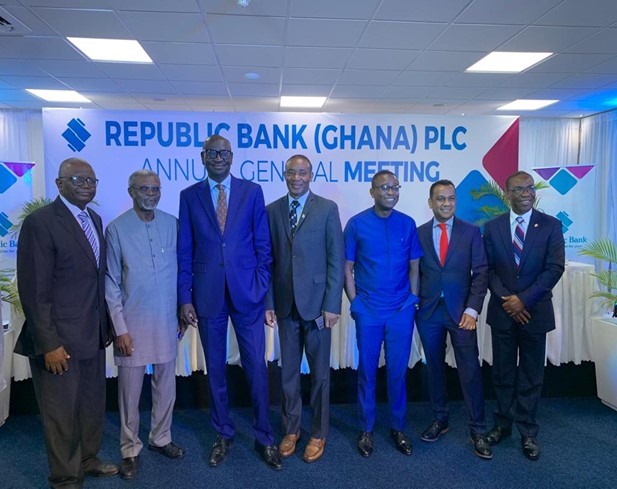Managing Director of Republic Bank, Benjamin Dzoboku has said the bank does not expect to be impacted by the second round of the Domestic Debt Exchange Programme (DDEP) as well as the cocoa bills.
Speaking during the bank’s Annual General Meeting (AGM) for 2022, he explained that the lender did not have any exposure to the dollar-denominated instruments. Similarly, it held only GH¢400 million, that is, 5 percent of the outstanding GH¢7.96 billion worth of outstanding cocoa bills.
“We do not have any exposure in the dollar-denominated bonds, but we do have a small exposure in the cocoa bill and the exposure amounts to approximately GH¢400 million,” he said.
He pointed out that the bank is being proactive in managing this exposure by taking provisions for it, even though the impact is not expected to significantly affect the bank’s profitability for the current year. The swap of the debt instruments forms part of the government’s attempt to restructure domestic debt worth GH¢123 billion.
Better than expected
In the year under consideration, Republic Bank performed “better than expected,” its MD said, citing the myriad of headwinds that the entire industry was confronted with. The bank generated broad revenue of GH¢478.7 million in 2022, compared to GH¢374.5 million recorded in the previous year.
It saw its total assets rise beyond the GH¢5 billion mark, with a 20.2 percent growth over the GH¢4.2 billion recorded in the previous year. Similarly, liabilities grew by 25 percent from 2021 to hit GH¢4.4 billion in 2022, largely on account of an increase in deposits. The unfriendly factors, however, led to a pre-tax loss of GH¢26 million, versus a profit of GH¢125.6 million in the previous accounting year.
The bank’s losses resulting from a substantial impairment loss were evident in its year-end financials, notably in the negative returns on assets (ROA) and equity (ROE). The ROA stood at -0.49 percent, and the ROE at -3.18 percent, respectively.
Additionally, the bank experienced a rise in its non-performing loan (NPL) ratio, increasing from 15.32 percent in the previous year to 19.85 percent, mainly due to the expansion of the NPL portfolio, a development Mr. Dzoboku expects to be rectified by the close of this year.
“When we look at the economic situation in 2022, we noticed that inflation went up quite a bit, reaching around 54 percent. On top of that, the exchange rate was all over the place, and we had some exposure to foreign currency risks. To play it safe, we decided to convert most of those foreign currency loans into cedis.
Doing that caused our non-performing loans to shoot up to about 19 percent. But we are positive that by December the non-performing loan ratio will see a significant drop,” he explained, with the bank’s regulatory forbearance-adjusted capital adequacy ratio above the threshold at 21.25 percent.
Looking ahead
The bank’s MD was optimistic that, barring any overwhelming externalities, Republic Bank should return to declaring dividends in 2025, following the expiration of the Bank of Ghana’s suspension of dividend payments and other distributions to shareholders, on account of the DDEP.
“We will continue to monitor and assess the impact of the macroeconomic-related and other potential risks on our operations, whiles pursuing initiatives to ensure that our services remain relevant to all stakeholders in 2023. We will continue to form strategic partnerships with various institutions aimed at enhancing brand visibility and the diversification of our products and services,” the MD said, adding that the performance in the first half of the year gave added cause for optimism.
Republic Bank’s unaudited second-quarter results revealed a profit of GH¢81.5 million, showcasing a significant increase from the previous year’s GH¢41 million. The surge in profitability was driven by a substantial rise in operating income, which hit GH¢329 million in the second quarter of 2023.
The bank’s asset base also expanded to GH¢6.2 billion, on account of a rise in cash and advances. Liabilities also rose to GH¢5.4 billion, primarily due to a significant increment in customer deposits amounting to GH¢4.8 billion.










